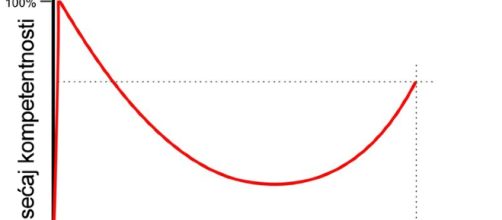Many companies suffer from Incompetent employees. But what psychology has revealed is surprising: in many cases, these employees do not know this. They have a misperception about themselves (they think they are in the "elite team" of the company) and that their productivity is excellent. They do not see how incompetent they are.
The Effect
This distorted perception makes up the Dunning-Kruger effect, described in 1999 by American psychologists David Dunning and Justin Kruger. Over four tests, they asked college students to answer quizzes about grammar, humor, and logic, interviewing these same students later.
When the students who obtained the worst grades were asked as they self-assess with the other students, they responded with inflated views about their skills and competencies. This same effect can be seen in anyone's daily life: in a survey of two different technology companies, about 32-42 percent of engineers consider themselves to be among the best in their companies; about 88 percent of American drivers think they drive above average; 21 percent of Americans believe they will become millionaires in 10 years and a classic study done at the University of Nebraska showed that more than 90 percent of professors see themselves above average in ability to teach. These numbers come from a report by Forbes.
The Bubble
The Dunning-Kruger effect is invisible to who is living in it. The person is trapped in a bubble where perception is completely distorted - and this makes them highly vulnerable. What is more interesting is that usually the worst skill is often the one that the person thinks is the best. The problem has two pillars: the lack of skills and knowledge causes the incompetent person to make bad choices. As a result, these gaps in knowledge prevent them from seeing their own inability to perform their chosen tasks. This is the paradox in which the person is trapped. An opposite (and rather curious) effect is that highly-skilled people can also present a distorted judgment about themselves, in this case, the opposite of the incompetent: they think their skills are trivial and that anyone can do what they do.
The Solution
But how to get out of it? The first tip is to learn to listen to peer feedback, however difficult it may be. The perception of others can provide valuable tips to open the eyes of those who are immersed in Dunning-Kruger. Another tip is always to continue learning: the more we deepen our knowledge in determining the subject, the less we trust in our Abilities and the better they become the self-judgments. People who have a reasonable knowledge of a certain area usually know how much they still need to evolve to reach a higher level.
In the words of Confucius, "Real knowledge is to know the extent of one's ignorance."

